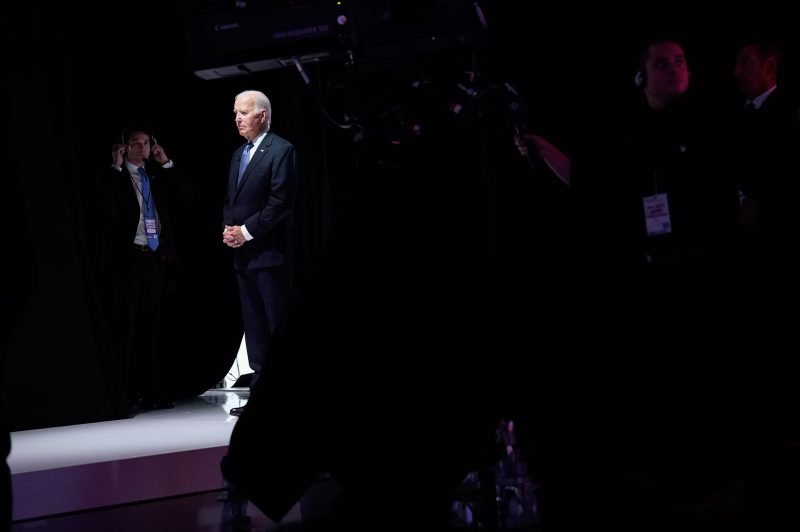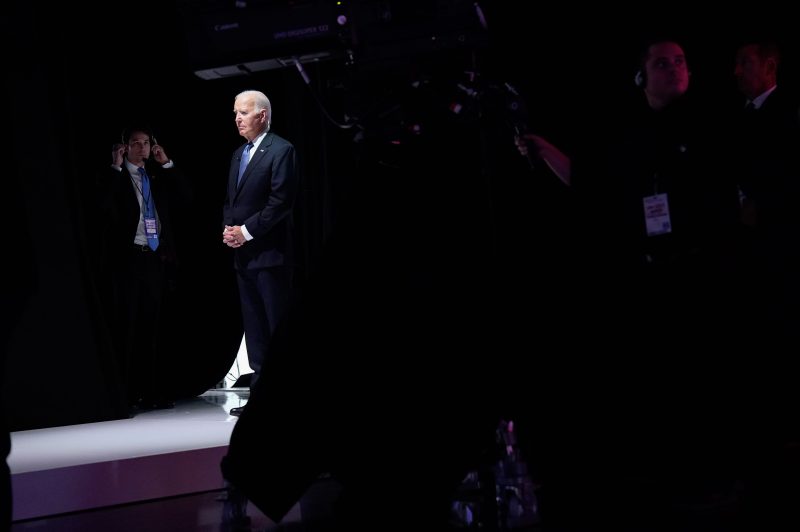
CAMP DAVID, Md. — President Biden’s debate prep went fine.
In the sessions, the president still spoke haltingly. He sometimes confused facts and figures. He tripped over words and meandered. Debate prep would not fix his stutter or make him appear any younger, aides knew.
But as Biden boarded Marine One to leave the rustic Camp David presidential retreat for Atlanta, they sought to reassure anxious allies. The president, they said, was prepared and would perform well. Some said the debate might even be boring.
This story is based on conversations with eight individuals involved in or briefed on the president’s debate preparation, all of whom spoke on the condition of anonymity to describe private meetings. The Biden campaign declined to comment.
For a full week, the president sequestered himself at Camp David with more than a dozen aides to prepare for Thursday’s presidential debate with former president Donald Trump. He rehearsed answers, met with policy aides and participated in mock debates, with his personal lawyer, Bob Bauer, playing the part of Trump.
Every topic he was asked about Thursday, he had practiced answers for — including the final one about his age.
So aides were bewildered by his performance. Many felt they had never seen him collapse so dramatically. After all, Biden was a veteran of numerous debates — as a senator, vice-presidential nominee and presidential candidate. And they did not understand why he gave an entirely different answer on the age question than the one they spent more than a week perfecting.
The president did not just stumble over words. He appeared to lose his focus and often was unable to finish sentences. His voice was raspy and thin, and when the debate concluded, first lady Jill Biden appeared to help her husband down the stairs.
His performance sent shock waves through the Democratic Party, resulting in calls from some Democrats for him to step aside. In the 48 hours after the debate, Biden campaign officials sought to reassure supporters and donors, blaming the debate on “just a bad night” and vowing that the president would remain in the race. The president should be judged by his 3½ years in office, they argued, not 90 minutes onstage.
But with another debate scheduled for September — a Biden campaign spokesman said the president would not withdraw from it — aides and allies are scrutinizing the president’s preparation for last week’s debate to figure out if they missed signs of what would unfold in CNN’s Atlanta studio.
Biden’s aides over the years have developed a tested formula to prepare him for debates, a process overseen by Ron Klain, his first White House chief of staff and longtime debate guru for Democratic presidential candidates. Early in the process, Biden will often meet with Klain one-on-one or with a small group of aides to practice answers, sometimes writing his favorite responses on notecards — his way, aides say, of clarifying his thinking.
Aides who work on specific topic areas, such as national security or the economy, will join the prep for sessions focusing on those topics. Finally, Biden will partake in mock debates, designed to mimic the actual event as closely as possible.
At Camp David, Biden participated in several such mock sessions, held in a movie theater and airplane hangar outfitted to resemble the CNN studio. They were held at various times of day, including at night when Biden sometimes seems to flag and when the debate was to be held, officials said.
Some Biden officials speculated that the president was overprepared by days of lengthy prep sessions and got inside his own head. Others lamented that too many aides were part of the preparations, noting that the White House distributed a list of 18 officials who accompanied the president to Camp David, and that did not even include everyone who was involved.
Not all of these people were in the room with Biden at all times, people familiar with the preparations said. But they still noted that there is a risk in having too many opinions, which can be contradictory and confusing.
When the debate began Thursday, Biden’s top aides, gathered in a hold room at the CNN studios, knew immediately the president had gotten off to a rough start, stumbling on answers about the economy and ending remarks about the national debt with a gaffe: “We finally beat Medicare.” Trump seized on the flub.
Early in the debate, Biden officials started telling reporters the president had a cold and a sore throat, an effort to explain why his voice sounded weak and raspy.
“We were asked about his hoarse voice,” Karine Jean-Pierre, the White House press secretary, told reporters aboard Air Force One on Friday. “We shared that he had a cold, we shared that he tested negative [for covid], and then we moved on. That’s it. It was from his — his voice as he was speaking during the debate, obviously.”
Still, at a feisty campaign rally the next day, Biden’s voice showed no sign of the previous night’s raspiness.
Biden’s aides and allies had worried for months about whether he should take part in the traditional presidential debates. Some vigorously argued he should not participate, concerned that he was not up to the task and that Trump would dominate the encounter with his shouting and bluster.
Others thought skipping a debate would make Biden look weak. And they predicted that he would perform well, pointing to the forceful delivery of his State of the Union address, when he engaged in a rapid-fire exchange with Republican lawmakers who heckled him.
The Biden campaign ultimately agreed to two debates, insisting the events would be on their terms: There would be no studio audience, and each candidate’s microphone would be muted when it was not their turn to speak. Some allies speculated afterward that those rules may have actually helped Trump by reining in his impulse to interrupt his opponent and play to the crowd, moves that appeared to turn off television viewers in previous debates.
And Biden’s aides demanded an unusually early date for the first encounter, in hopes that a strong performance would turbocharge the president’s campaign — and calculating that it would give Biden time to recover if he floundered. Rather than turbocharging the campaign, the event has prompted a surge of renewed calls for him to reconsider his candidacy.
On Thursday night, after Biden left the debate studio, he stopped by a Waffle House and told reporters he thought he “did well.” But in the following hours, the campaign scrambled to control the damage. Officials worked to reassure donors, allies warned against overstating the effect of a bad night, and Biden himself debuted a new line to address his age.
“I don’t walk as easy as I used to,” he said Friday at a boisterous rally in Raleigh, N.C. “I don’t speak as smoothly as I used to. I don’t debate as well as I used to. But I know what I do know: I know how to tell the truth.”
At a fundraiser later Friday, the first lady told donors her husband had admitted something went wrong.
“After last night’s debate, he said, ‘You know, Jill, I don’t know what happened. I didn’t feel that great,’” she recounted. “And I said, ‘Look, Joe, we are not going to let 90 minutes define the four years that you’ve been president.’”
By the end of his three-day swing, even the president was acknowledging publicly that the night did not go his way.
“I understand the concern after the debate. I get it — I didn’t have a great night,” he said at a fundraiser Saturday night in Red Bank, N.J. “But I’m going to be fighting harder.”
Michael Scherer in Washington contributed to this report.

